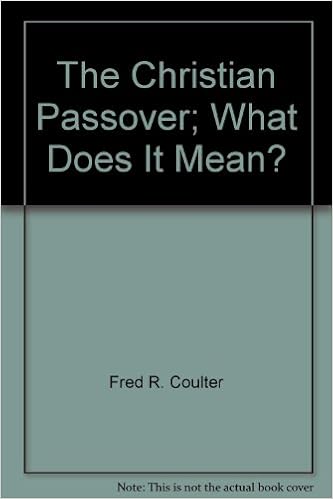I pulled this book up online hoping to find out more about the origins of the Christian Eucharist and the history of how the Passover came to be transformed into it. Coulter's work, over five hundred pages, was mostly a disappointment in that regard. He refers readers to various anthropological and anti-Catholic polemics in that regard, which mostly focus not on the transformation but on the parallels between the Eucharist and various pagan rituals but never really explain how the latter became part of Christianity in a narrative sense.
The exploration of that theme is not Coulter's purpose, however. His focus is on how the Passover in the New Testament was celebrated and how the Jewish Passover transformed itself coming out of the Old Testament. In that sense, it is a fascinating read, because few other authors I've read have really explained, chronologically, how the Jewish Passover became a seder meal.
Coulter does a convincing job showing how the original Passover was celebrated on the night of Abib 14 in individual homes, throughout most of Jewish history. His contention is that the Passover was transformed into a Temple-priest-orchestrated sacrifice during the late first kingdom period of Judah, in an attempt to rid Judah of pagan traditions that had crept into the nation.
In this exploration, Coulter also shows how the at-home Passover continued into Jesus's day, even as the priestly Temple Passover had come to dominate the practice of some Jewish sects. At the same time, he shows how some Jews kept the Passover at the start of the fourteenth and some at the end, demonstrating how the biblical scriptures actually mandate the Passover at the beginning of the fourteenth. The move to the fifteenth, he contends, was caused by Hellenization and calendar/time changes, as the Jewish way of reckoning the day moved from sunset to sunset to, for a time, sunrise to sunrise, among other events.
Using this understanding, Coulter is able to document a timeline for Jesus's crucifixion and his own keeping of the Passover, at the start of the fourteenth. He also, surprisingly, shows how in the year that Jesus was killed, the Temple Passover was likely stopped before it could be completed, because of the earthquake that tore portions of the Temple apart.
One could say that the book really falls into three parts: a discussion of the Hebrew terms used with regard to the timing of the Passover; a discussion of the history and transformation of the Passover among the Jews; and a discussion of the meaning of the Passover. Appendixes go into even more detail with regard to mostly the first item.
The one thing I did not find sufficiently discussed in the book is Coulter's interpretation of Paul's term the "Lord's Supper." Coulter contends, but never really explains why he believes it to be so, that Paul was using the Lord's Supper in reference to the Jewish Old Testament Passover. Indeed, the meal Paul describes in the passage in First Corinthians could be just such a meal. However, at least in my research, I find that the term could be a reference to many different things, few of them definitive (other than a likely comparison on the part of Paul between the sacrifices pictured in such a supper). Although I'd agree with Coulter that "Lord's Supper" in reference to the Eucharist is a comparatively modern innovation--and quite likely a misinterpretation of Paul's usage--early uses of the term by later early Christian writers show it being a synonym for various fellowship meals; hence, the Old Testament Passover interpretation of the term isn't necessarily a given, the way that Coulter makes it seem. I needed more explanation for why Coulter believes that was Paul's intent with regard to the terminology.
Still, one would be hard pressed to find a more thorough book on the subject of the New Testament Passover. I much enjoyed it.







No comments:
Post a Comment